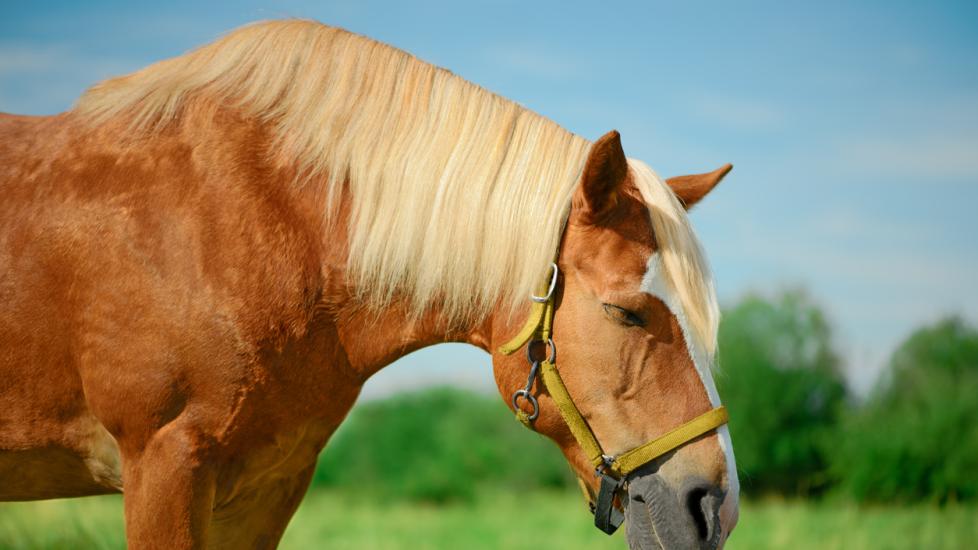Do Horses Sleep Standing Up?
iStock/Irina Orlova
Like humans, sleep is essential for the wellbeing of a horse. However, the sleeping patterns and characteristics of horses are unique. Ever wonder, “Do horses sleep standing up?”
Horses sleep both while standing and while lying down. Horses are polyphasic sleepers, which means they have multiple periods of sleep throughout the day, with the majority occurring at night.
Sleep patterns are based on a horse's:
-
Environment
-
Social hierarchy
-
Age (newborn foals sleep a lot!)
-
Feeding schedule
-
Familiarity with surroundings
How Do Horses Sleep?
Four stages of sleep have been documented in horses:
-
Wakefulness
-
Drowsiness
-
Slow wave sleep (SWS)
-
Rapid eye movement (REM) sleep
In SWS, a horse’s brain waves are slow and synchronized. During this time, the brain is not functioning at an active level. SWS may occur while the horse is standing or in sternal recumbency (lying on the chest with legs folded underneath).
In REM sleep, brain waves are rapid and irregular, like those of an awakened state. During REM sleep, a horse’s eyes move back and forth rapidly. Your horse may also:
-
Twitch the ears or skin
-
Blink
-
Flare nostrils
-
Paddle legs
REM sleep occurs while the horse is lying on his side (in lateral recumbency). During REM sleep, all the muscles completely relax.
Why Do Horses Sleep Standing Up?
Most of a horse’s sleep is done in the standing position and is considered SWS. Total sleep time is usually comprised of cycles of sleep interrupted by periods of wakefulness.
A special anatomical feature of horses called the stay apparatus allows them to sleep standing up. A stay apparatus is a group of tendons and ligaments that work together so the horse can remain standing with little muscular effort.
This is a great advantage for a prey animal like a horse. In the event of an emergency, they can quickly awaken and easily flee.
A special anatomical feature of horses called the stay apparatus allows them to sleep standing up.
Do Horses Lie Down?
There is no definitive amount of time that horses can lie in lateral recumbency, but they can’t stay there for too long.
The horse’s weight alone applies pressure to areas of the body, restricting blood flow to vital organs and limbs. The lungs are also compressed, which can lead to abnormal breathing patterns.
The pressure can also affect nerves, rendering the horse’s limbs temporarily paretic (muscle weakness caused by nerve damage). When horses try to get up, they have difficulty standing on all four limbs, which can lead to secondary trauma.
How Long Do Horses Sleep?
On average, most horses spend a combined total of five to seven hours a day sleeping.
It is generally accepted that horses spend approximately 15% of their total sleep time in REM sleep. While some horses get two to three hours of REM sleep per day, all horses need at least 30 minutes.
Can Horses Have Sleeping Disorders?
Sleep disorders in horses are poorly understood. Research groups are continuing to study sleep disorders in horses including:
Sleep Deprivation
Sleep deprivation is caused by a lack of sleep, which can occur during:
-
Travel (such as a long haul on a trailer)
-
Change in environment or routine
-
Inadequate bedding or lack of a place for a horse to lay comfortably
-
Orthopedic or neurologic problems that prevent a horse from lying down.
Symptoms of sleep deprivation can occur in as little as five to seven days of incomplete REM sleep.
Narcolepsy
Narcolepsy is a sleep disorder triggered by strong emotions and activity. It’s characterized by excessive daytime sleepiness and abnormal REM manifestations.
Narcoleptic horses may have sudden loss of muscle tone and sudden onset of sleep or collapse.
Hypersomnia
Hypersomnia is a condition of excess sleep; however, this sleep is not restorative and usually doesn’t include REM sleep, leading to more sleepiness.
Hypersomnia can be a primary problem or due to an underlying endocrine or neurologic disease.
Symptoms of Inadequate Sleep in Horses
Common symptoms of horses getting inadequate sleep include:
-
Excessive daytime drowsiness
-
Abrasions on the knees and fetlocks (from collapsing episodes)
-
Reluctance or inability to lie down
-
Impaired athletic performance
A complete veterinary work-up with video monitoring observations and a continuous electroencephalography (EEG) is recommended to diagnose and treat a horse’s sleep disturbances.
References
Aleman, M. Veterinary Information Network. Use of Electroencephalography in Equine Species. 2011.
Belling, T. Sleep Patterns in the Horse: A Review. Equine Practice. 1990; 12:22-27.
Aleman M., Williams D., Holliday. Sleep and sleep disorders in horses. Proc Am Assoc Equine Pract 2008;54:180-185.
University of Illinois College of Veterinary Medicine. Let Sleeping Horses Stand. ACES News. 2009.
